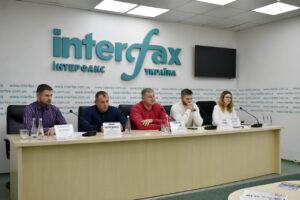
Participants in a press conference on “Problems of the capital’s agglomeration: the boundaries of the city of Kyiv” called for systematic dialogue between the Kyiv city authorities and communities in the suburban area, stressing that the lack of coordinated approaches hinders development and provokes legal disputes.
“There are many problems, but there are solutions to all problems if there is a will. If there are not enough laws, new ones can be passed. If there are not enough codes, they must be created. However, if the Kyiv authorities are not interested, the result will be the same. International partners are ready to provide Ukraine with financial and technical assistance to implement reforms, but practical progress depends on the willingness of central and local authorities to work together,” said Oleksiy Usachov, chairman of the board of the Ukrainian Policy Institute, at a press conference at the Interfax-Ukraine agency on Wednesday.
He noted that systematic cooperation based on mutual respect and openness to dialogue should be a key factor in the development of the capital’s agglomeration. Usachov stressed that further ignoring the problem would lead to a loss of time and investment. In conclusion, the moderator noted that the issue of agglomeration development will only gain real momentum if democratic elections are held and local authorities resume their political responsibility.
Serhiy Danish, head of the Kotsyubynska ATC, said that the community does not object to substantive dialogue on the future of the village, but expects clear proposals and guarantees from Kyiv.
“If Kyiv wants to annex us, our territory, our people, then it must have something to offer. The Kyiv City Council’s decision on ‘annexation for zero hryvnias’ does not correspond to the realities and needs of the residents. Instead, the capital must first demonstrate its willingness to invest in social infrastructure — kindergartens, schools, roads — so that people themselves will go to Kyiv because of better conditions and services,” he stressed.
Danish also pointed to conflicts with the state cadastre and fiscal charges. According to him, more than half of the village was entered into the cadastre as Kyiv, after which the village council was sent demands to pay land tax “under the village council’s land.”
According to Danish, despite the fact that the Kotsyubynska, district, and regional councils had prepared a complete set of documents, the head of the cadastre went on sick leave and effectively blocked the case, citing the unresolved issue with Kyiv. As an illustration of the risks of annexation without proper guarantees, he cited the example of Zhuliany, where after joining the capital there are no roads, no lighting, no infrastructure, and the interests of the community are represented on a residual basis.
Svitlana Dakhno, head of the land relations department of the Kyiv Regional State Administration’s Department of Urban Development and Architecture, reported that the Kyiv Regional State Administration is cooperating with the Kotsyubynska community and other adjacent ATCs, but “the lack of a coordinated position between the city community of Kyiv and the communities near the capital negatively affects development and generates a significant number of legal disputes.” She noted that the lack of a coordinated position between Kyiv and the surrounding communities already has tangible consequences, particularly in the area of land relations and territorial planning.
“The Kyiv Regional State Administration works directly with the Kotsyubynska community. The lack of a coordinated position between the Kyiv city community and the communities surrounding the capital has a negative impact on development and gives rise to a significant number of legal disputes. The regional administration supports the position of the territorial communities and is interested in developing a common position and bringing the issue into line with the law, as this directly affects the development of communities and their ability to exercise their powers in the relevant territories,” Dakhno said.
Igor Reva, deputy head of the Kyiv City Military Administration, stressed the need to “lower the level of dialogue” to the public arena so that the topic of agglomeration becomes socially significant and “public pressure” for decision-making emerges.
“If we keep doing the same things, we will get the same results… We need to create a platform where the public can exchange ideas, develop specific decisions, and continue to put pressure on the authorities,” he said.
Ivan Fursenko, advisor to the Association of Ukrainian Cities, noted that substantive discussion of the Kyiv agglomeration became possible in 2020 after the formation of capable communities with equal powers around the capital. In his opinion, the key is consistency in management decisions and strategic planning based on European approaches.
“Europe relies on strategic planning documents at the agglomeration level. Consistency of power and political will are needed: someone has to take on additional responsibility, and someone has to give it up,” the expert stressed.
According to regional authorities, the legislative framework is sufficient for developing models of cooperation and coordination, but strict compliance with the rules is necessary. Oleg Ivanenko stressed that agglomeration policy cannot be based on unilateral decisions. He noted that the Kotsyubynska community is capable and has a sufficient budget, and any agreements must be made in a civilized manner with the participation of all parties.
The issue of suburban communities’ investment participation in joint infrastructure projects and possible adjustments to powers in the event of the adoption of a special law on the Kyiv agglomeration was discussed separately.
“Satellite cities must be prepared to invest significantly in bilateral cooperation; if an agglomeration is created, their powers in terms of planning and development may be partially redistributed,” it was noted at the event.
Participants also recalled that the Kyiv agglomeration is the largest urban entity in Ukraine with a population of several million, so the task is to ensure a comfortable living space and balanced development of both the capital and the surrounding communities.
The press conference was attended by: Oleg Ivanenko, deputy of the Kyiv Regional Council and Paralympian; Andriy Yeremenko, sociologist and founder of Active Group; Ivan Fursenko, advisor to the Association of Ukrainian Cities; Svitlana Dakhno, head of the Land Relations Department of the Kyiv Regional State Administration; Serhiy Danish, head of the Kotsyubynska OTG; Ihor Reva, deputy head of the KMVA. Moderator — Oleksiy Usachov, chairman of the board of the Institute of Ukrainian Politics.
Source: https://interfax.com.ua/news/press-conference/1118304.html
ACTIVE GROUP, Dakhno, DANISH, Єременко, Іваненко, Рева, Усачов, Фурсенко
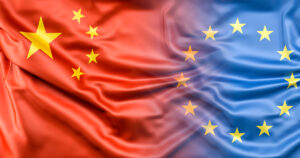
China remains the undisputed leader among Ukraine’s trading partners in terms of import volume. In the first six months of 2025, Ukraine imported Chinese goods worth US$8.15 billion. This is more than twice the figures for Poland ($3.58 billion) and Germany ($3.18 billion), which ranked second and third, respectively.
High import volumes were also recorded from Turkey ($2.53 billion) and the United States ($2.31 billion). Italy, the Czech Republic, Slovakia, Bulgaria, and France round out the top ten key suppliers with volumes ranging from $1.2 billion to $979 million.
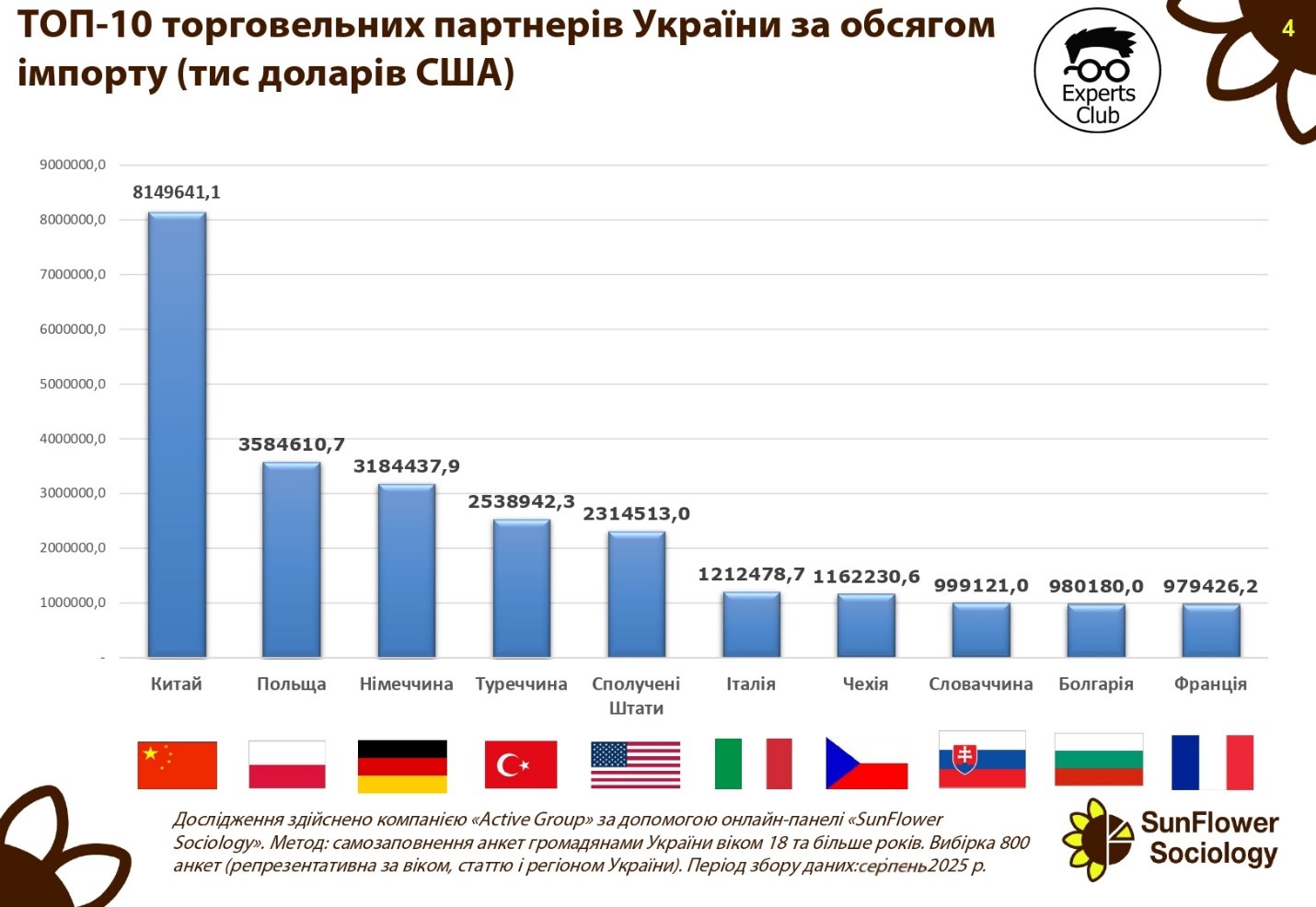
“The formation of such an import structure indicates Ukraine’s excessive dependence on Chinese goods, especially in the electronics, technology, and industrial products segments. Such an imbalance poses risks to economic stability, as any political or logistical restrictions will immediately affect the domestic market,” emphasized Maksim Urakin, founder of Experts Club and economist.
At the same time, experts point to the diversification of supplies from European Union countries. Poland, Germany, Italy, and France together account for more than $8.5 billion in imports, forming a significant segment of the domestic consumer and industrial market.
Economists predict that, provided the hryvnia exchange rate remains stable and import flows continue at current levels, the trade deficit with China will continue to grow. This will require an adjustment of state trade policy towards stimulating domestic production and searching for alternative markets.
ACTIVE GROUP, CHINA, ECONOMY, EU, EXPERTS CLUB, GERMANY, IMPORTS, POLAND, SunFlower Sociology, TRADE BALANCE, TURKEY, UKRAINE, USA, МАКСИМ УРАКИН
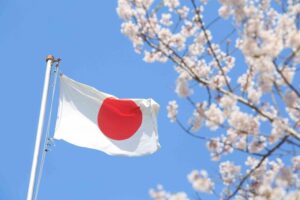
According to a survey conducted by Active Group in collaboration with Experts Club in August 2025, Ukraine has one of the most positive attitudes toward Japan among countries worldwide.
According to the study, 68.7% of Ukrainians have a positive opinion of Japan (33.0% — mostly positive, 35.7% — completely positive). Only 2.7% have a negative opinion, while 26.7% of respondents are neutral. Another 2.0% admitted that they know little about the country.
“Japan occupies a special place in the perception of Ukrainians. It is seen as an example of a country that has achieved great results through innovation, technological development, and the preservation of traditions. This level of trust can become the basis for further expansion of cooperation between our countries,” emphasized Active Group CEO Oleksandr Pozniy.
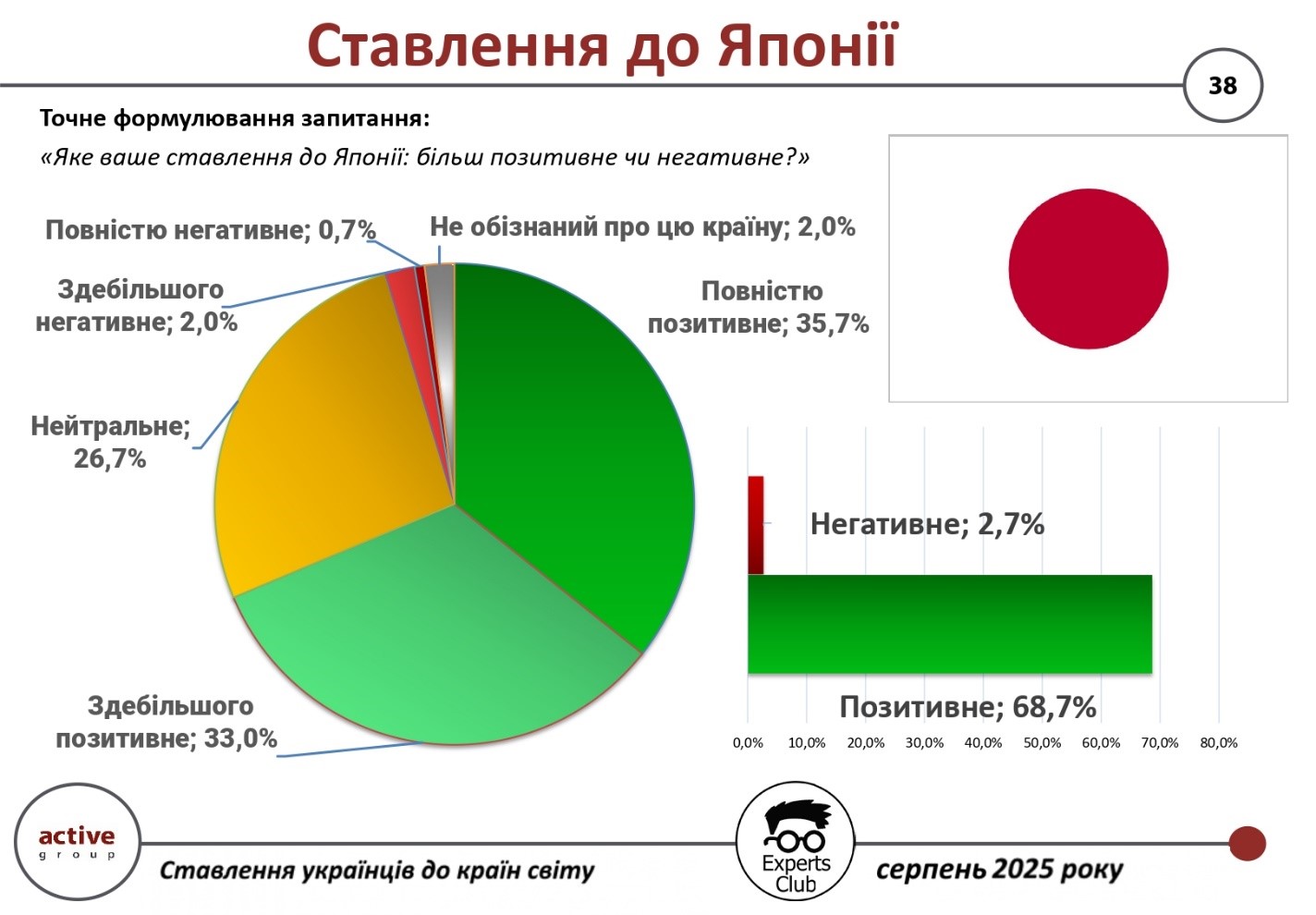
In turn, Maksim Urakin, co-founder of Experts Club, emphasized the economic dimension:
“In 2025, the total trade volume between Ukraine and Japan exceeded $521 million. At the same time, Ukrainian exports to Japan amounted to only $18 million, while imports exceeded $502 million.
This resulted in a significant negative balance of $484 million. Such an imbalance is a signal to look for new opportunities for Ukrainian goods to enter the Japanese market,” he stressed.
The study was part of regular monthly monitoring of Ukrainians’ attitudes toward key international partners.
The full video can be viewed at: https://www.youtube.com/watch?v=YgC9TPnMoMI&t
You can subscribe to the Experts Club YouTube channel here: https://www.youtube.com/@ExpertsClub
ACTIVE GROUP, EXPERTS CLUB, JAPAN, Pozniy, RELATIONS, SOCIOLOGY, TRADE, UKRAINE, URAKIN
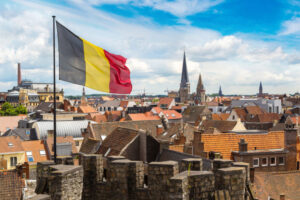
Ukrainians’ attitude towards Belgium is mostly positive, although a significant portion of respondents take a neutral position. This is evidenced by the results of a nationwide sociological survey conducted by Active Group in collaboration with Experts Club in August 2025.
According to the results, 54.7% of Ukrainians have a positive attitude towards Belgium (35.3% — mostly positive, 19.3% — completely positive). Only 2.7% of citizens expressed a negative attitude (0.3% — mostly negative, 0.3% — completely negative). At the same time, 43.0% of respondents remain neutral, and 2.3% said they do not have enough information about the country.
“Belgium is perceived by Ukrainians as an important member of the European Union and NATO, a country that consistently supports Ukraine on the international stage. At the same time, its relative remoteness and lack of deep historical ties account for the high proportion of neutral assessments,” explained Active Group founder Oleksandr Pozniy.
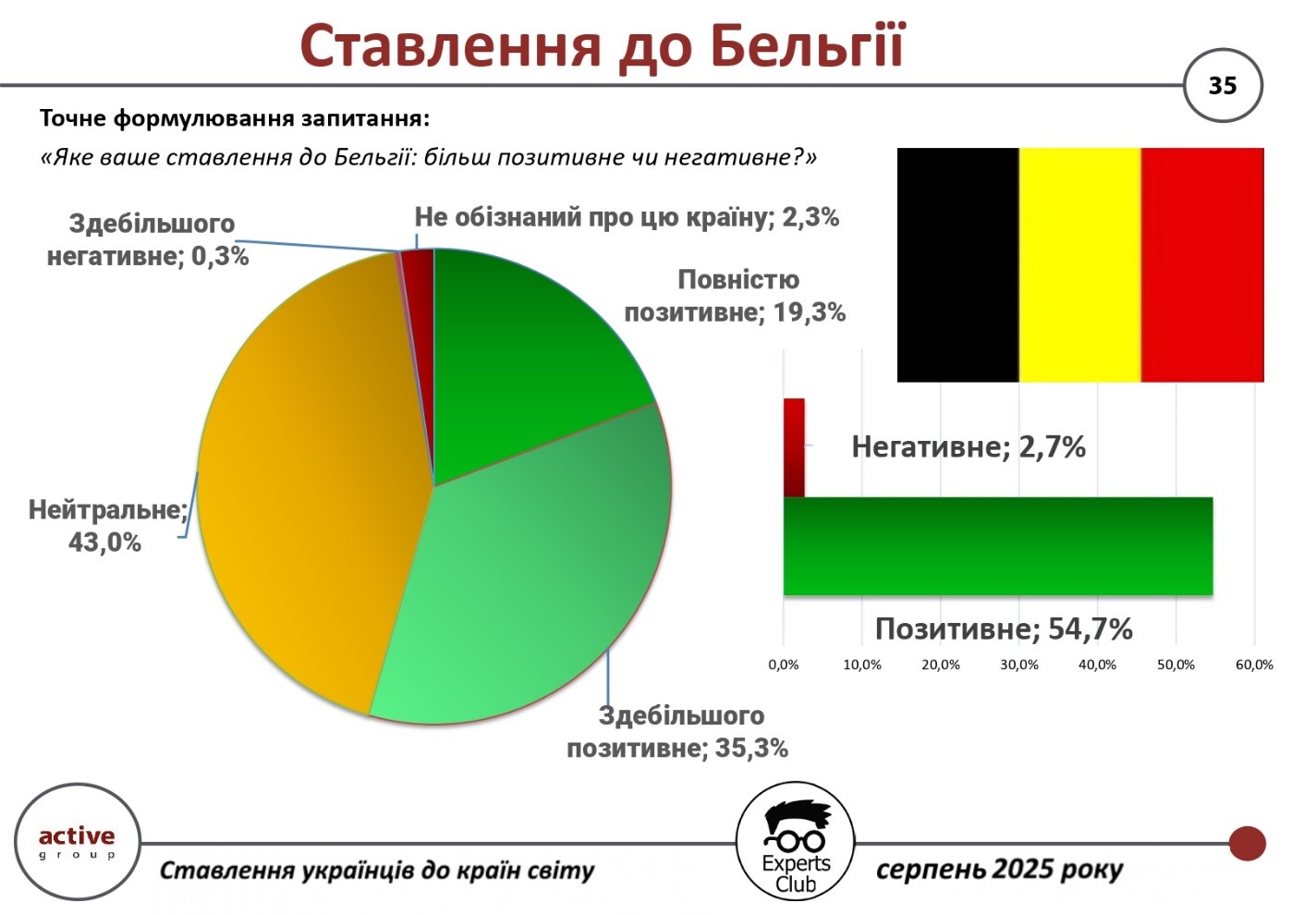
In turn, co-founder of Experts Club Maksim Urakin drew attention to the economic component of bilateral relations:
“In the first half of 2025, trade turnover between Ukraine and Belgium amounted to more than $584 million. Ukrainian exports amounted to about $235 million, while imports from Belgium exceeded $348 million. This resulted in a negative balance of $113.8 million, which highlights the Ukrainian market’s dependence on Belgian goods,” he emphasized.
The study is part of a broader project aimed at examining the international sympathies and antipathies of Ukrainians in 2025.
The full video can be viewed at: https://www.youtube.com/watch?v=YgC9TPnMoMI&t
You can subscribe to the Experts Club YouTube channel here: https://www.youtube.com/@ExpertsClub
ACTIVE GROUP, BELGIUM, DIPLOMACY, EXPERTS CLUB, Pozniy, SOCIOLOGY, TRADE, URAKIN
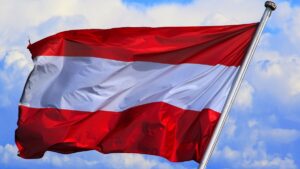
Ukrainians’ attitude towards Austria is generally positive, but a significant proportion of respondents remain neutral. These are the results of a nationwide sociological survey conducted by Active Group in cooperation with Experts Club in August 2025.
According to the survey, 48.7% of Ukrainians expressed a positive attitude towards Austria (37.0% — mostly positive, 11.7% — completely positive). Only 4.7% of citizens demonstrated a negative attitude (4.3% — mostly negative, 0.3% — completely negative). At the same time, the largest group — 44.7% of respondents — took a neutral position, while another 2.3% said they did not have enough information about the country.
“Austria is traditionally perceived by Ukrainians as a European country with high social standards, cultural heritage, and a stable political system. Although Austria is not Ukraine’s main partner in foreign policy, the overall level of sympathy remains positive,” emphasized Active Group founder Oleksandr Pozniy.
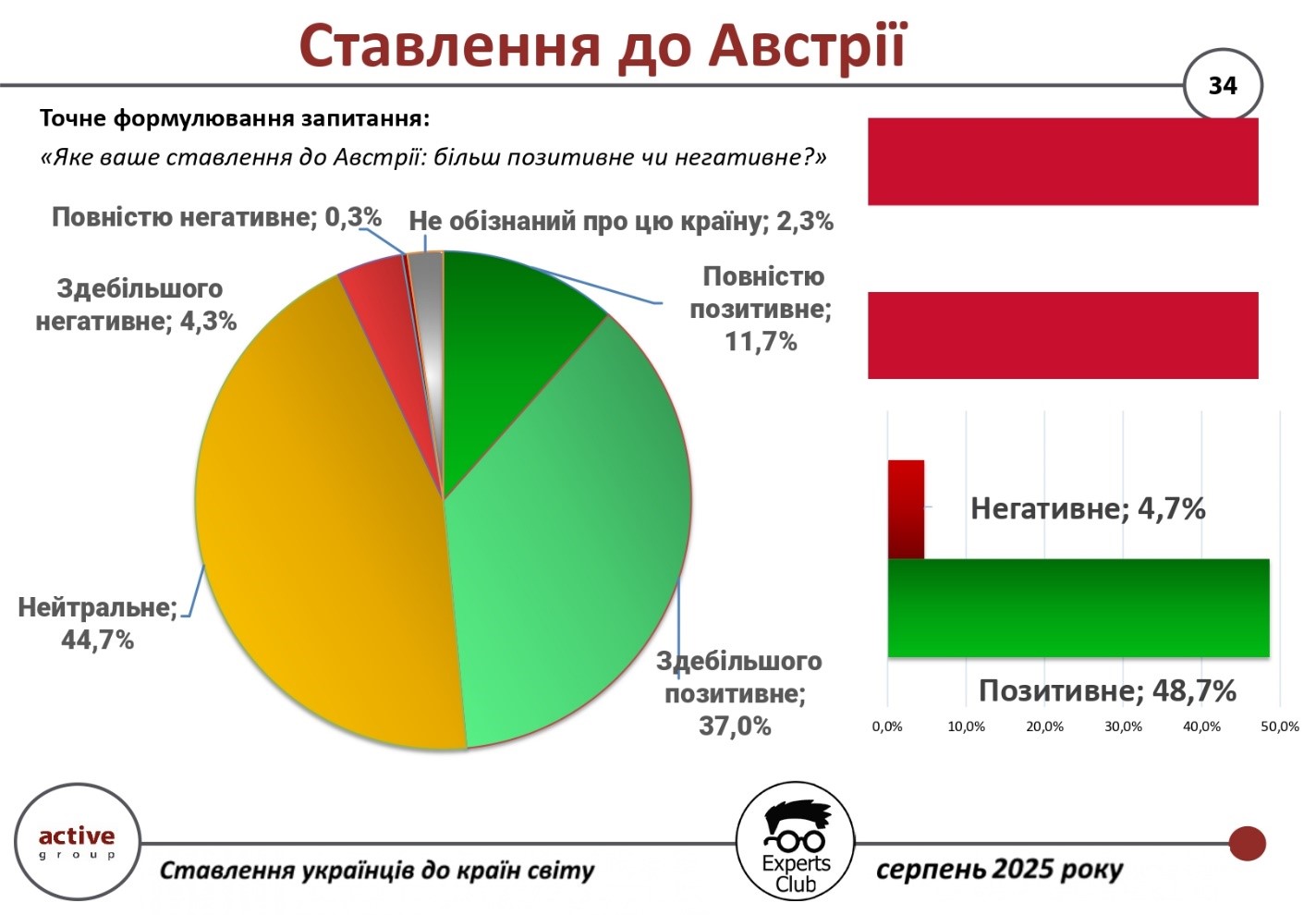
In turn, co-founder of Experts Club Maksim Urakin drew attention to the economic component:
“In January–June 2025, the total trade volume between Ukraine and Austria amounted to over $701 million. At the same time, exports of Ukrainian goods reached $276 million, while imports from Austria amounted to about $425 million. This led to a negative balance of $148.9 million, which indicates a significant advantage of Austrian exports over Ukrainian ones,” the expert emphasized.
The survey is part of a large-scale study of Ukrainians’ international sympathies and antipathies, reflecting not only political and cultural aspects, but also economic aspects of relations with various countries.
The full video can be viewed at: https://www.youtube.com/watch?v=YgC9TPnMoMI&t
You can subscribe to the Experts Club YouTube channel here: https://www.youtube.com/@ExpertsClub
ACTIVE GROUP, AUSTRIA, DIPLOMACY, EXPERTS CLUB, Pozniy, SOCIOLOGY, TRADE, URAKIN
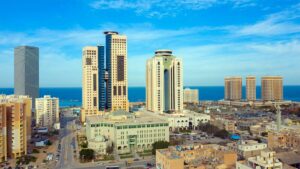
Ukrainians have a predominantly neutral attitude towards Libya, although the level of negative assessments is higher than for most other North African countries. This is evidenced by the results of a survey conducted by Active Group in partnership with Experts Club.
According to the data, 9.3% of respondents expressed a positive attitude toward Libya (6% — mostly positive, 3.3% — completely positive). A negative attitude was expressed by 14.3% of respondents (11.7% — mostly negative, 2.7% — completely negative). The majority of Ukrainians — 69.7% — took a neutral position, while another 6.7% said they did not have enough information.
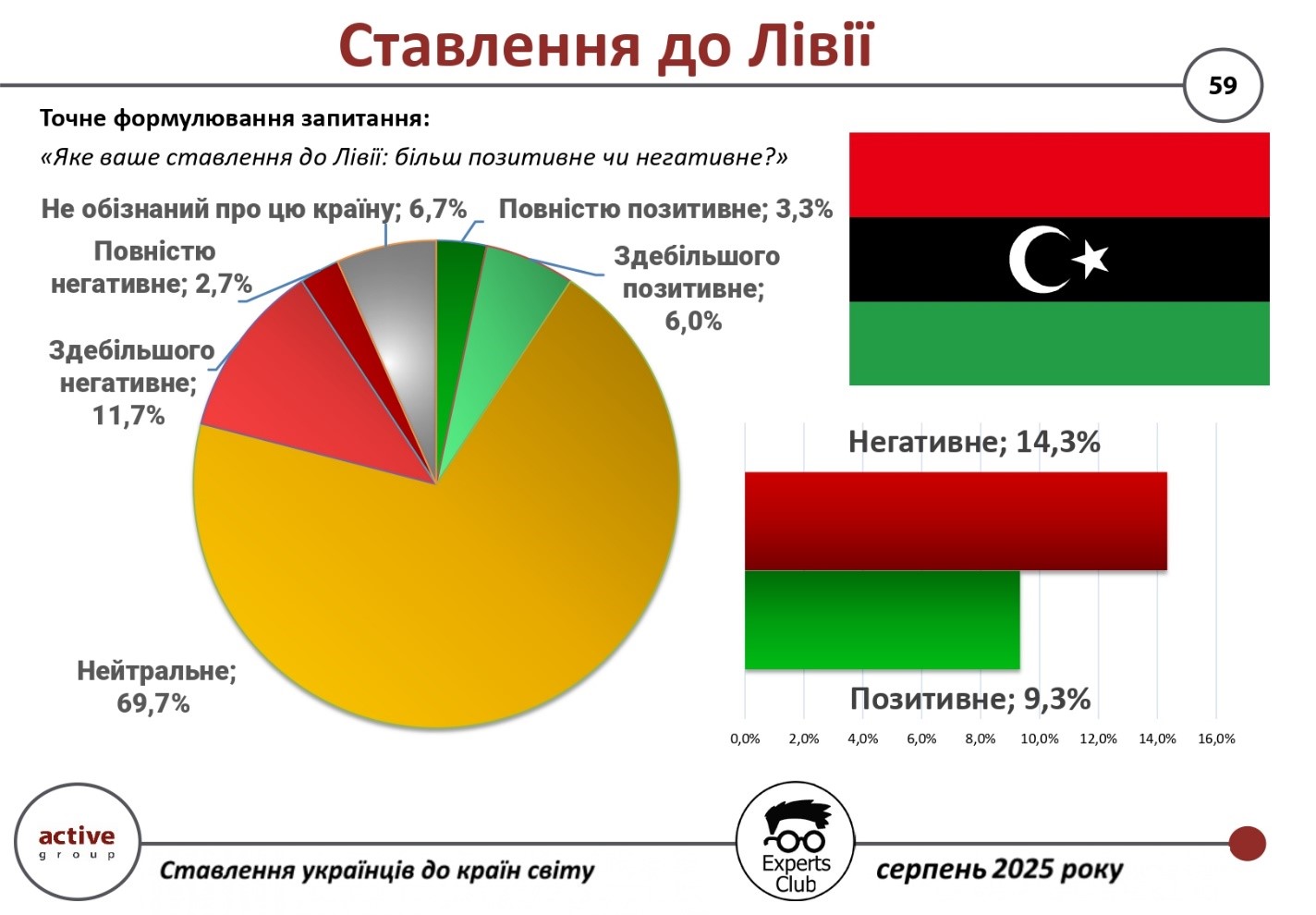
In 2024, trade turnover between Ukraine and Libya amounted to $149.7 million, of which exports accounted for $141.7 million and imports for $8.1 million. The positive balance was $133.6 million.
“Libya remains a traditional market for Ukrainian agricultural products, but political instability in that country affects both trade dynamics and perceptions among Ukrainians. The high level of neutrality indicates a lack of knowledge, as well as the absence of stable humanitarian and cultural ties,” commented economist and founder of Experts Club Maksim Urakin.
The full video can be viewed at: https://www.youtube.com/watch?v=YgC9TPnMoMI&t
You can subscribe to the Experts Club YouTube channel here: https://www.youtube.com/@ExpertsClub
ACTIVE GROUP, EXPERTS CLUB, Livia, Pozniy, SOCIOLOGY, TRADE, UKRAINE, URAKIN